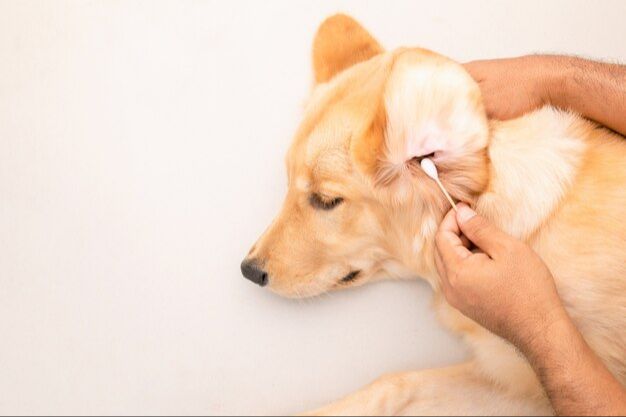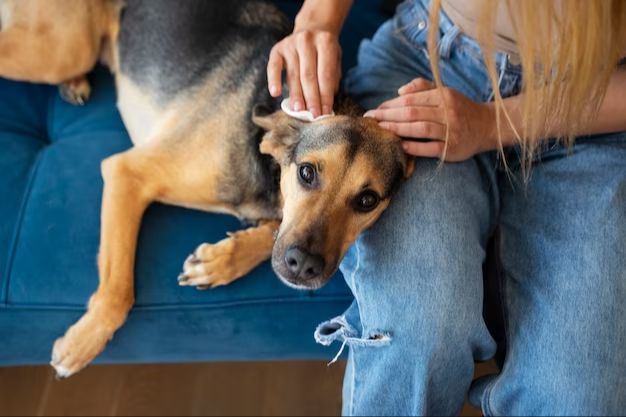What is Dog Ear Cleaner?
Dog ear cleaner is a solution used to gently clean out a dog’s ears and remove debris, wax, dirt, and moisture buildup. Keeping a dog’s ears clean and dry is important for preventing bacterial and yeast infections that can lead to smelly, itchy, and painful ears.
There are a few main types of dog ear cleaners:
- Ear wipes – Pre-moistened pads or cloths to wipe out the ear.
- Ear rinses – Liquid solutions meant to flush out the ear.
- Ear powders – Powders that cling to wax and dirt to remove it.
Common active ingredients in ear cleaners include:
- Alcohol – Helps dry out the ear.
- Acetic acid – Restores normal pH to prevent yeast and bacteria growth.
- Surfactants – Breaks down wax and facilitates removal.
Using a specially formulated ear cleaner can help dissolve and dislodge buildup while being gentle on the sensitive skin in a dog’s ears.

Benefits of Regular Ear Cleaning
Cleaning your dog’s ears regularly can provide important health benefits for your canine companion. Here are some of the main reasons why regular ear cleaning is recommended:
Prevents ear infections and yeast buildup – Dog ears are prone to developing infections, especially breeds with floppy ears like Cocker Spaniels and Beagles. Regular cleaning removes debris and wax buildup that can trap moisture and allow bacteria and yeast to thrive. Keeping your dog’s ears clean and dry is one of the best ways to prevent painful ear infections.
Removes dirt, debris and wax – Outdoor dogs especially will accumulate dirt and debris like grass seeds, sand and pollen in their ears. Regular cleaning keeps ears free of this buildup which can be irritating. Cleaning also removes excess ear wax which naturally accumulates.
Keeps ears smelling fresh – Dogs with gunky, yeasty ears will develop a foul odor. Regular cleaning keeps your dog’s ears smelling clean and pleasant.
Potential Risks of Over-Cleaning
While keeping your dog’s ears clean is important, over-cleaning comes with some risks. Cleaning too aggressively or too often can actually cause more harm than good.

One potential risk is that over-cleaning can dry out your dog’s ear canal. Dog’s ears are sensitive, and excessive cleaning strips away protective oils. This can lead to itching, inflammation, and irritation. A dried-out ear canal also provides an environment where yeast and bacteria can thrive.
Over-cleaning may also irritate your dog’s sensitive skin. Rubbing and scrubbing too hard can cause redness and inflammation. This is especially true if harsh cleaning products are used instead of gentle dog ear cleaners.
Lastly, overly frequent cleaning could lead to infection. Small scratches or irritation from over-cleaning create openings for bacteria and yeast to take hold. This increases the chances of developing a troublesome ear infection.
While you want to keep your dog’s ears clean, it’s important not to overdo it. Look for signs they need cleaning and stick to a regular schedule, but avoid going overboard.
How Often to Clean Dog Ears
When it comes to cleaning your dog’s ears, moderation is key. While regular cleaning is important, over-cleaning can lead to irritation and infection.
For dogs with healthy ears that do not produce much wax, cleaning them weekly or biweekly is usually sufficient. Use a cotton ball or pad soaked in a veterinarian-recommended cleaner to gently wipe out visible dirt and debris.
Dogs with chronic ear infections or yeast buildup may need more frequent cleanings, such as 2-3 times per week. This helps prevent exacerbation of the infection. Be sure to check with your vet first to ensure proper treatment.
It’s also a good idea to clean your dog’s ears after activities where they may have gotten wet or dirty, like swimming or bathing. The moisture can increase risk of infection.
While regular cleaning is important, you’ll want to avoid over-doing it. Cleaning too aggressively or too often can strip away protective oils and wax, leading to irritation. Unless your vet advises otherwise, stick to a once or twice weekly routine.
Signs Your Dog’s Ears Need Cleaning

There are several signs that indicate it’s time to clean your dog’s ears:
Head shaking or scratching – If your dog is shaking their head or scratching at their ears more than normal, this is a clear sign of irritation or discomfort that likely indicates a need for cleaning. Excess debris and buildup in their ears can cause itchiness and irritation.
Redness/swelling – Take a peek inside your dog’s ears and look for any redness, inflammation, or swelling. These are signs of infection or irritation, and cleaning can help soothe their ears and prevent more serious issues.
Odor – A foul, yeasty smell coming from your dog’s ears also means it’s time for a cleaning. Smelly ears indicate gunk and bacteria buildup that needs to be removed.
Discharge/debris visible – Finally, if you notice any discharge, crusted material, or dark wax, it’s a sign their ears need to be cleaned to remove the debris. Don’t neglect discolored or waxy buildup thinking it will resolve on its own.
Tips for Safe and Effective Ear Cleaning
When it comes to cleaning your dog’s ears, there are some important safety tips to keep in mind:
Choose a gentle, vet-approved ear cleaner. Look for a product specifically formulated for dogs that contains soothing, natural ingredients. Avoid anything with harsh chemicals or alcohol that could irritate your dog’s sensitive ears.
Never use Q-tips or insert any objects into the ear canal. This risks damaging the delicate inner ear structures. Only clean the outer part of the ear.
Massage the base of the ear gently. Using your fingertips, gently massage the base of the ear to help loosen debris and wax. Avoid digging into the canal.
Use cotton balls to wipe out excess liquid and debris. After applying the ear cleaner, use fresh cotton balls to gently wipe out any excess liquid, wax or debris from the outer ear.
By following these tips, you can safely and effectively keep your dog’s ears clean while avoiding injury or irritation.
Home Remedies to Avoid
When cleaning your dog’s ears at home, there are a few common home remedies you may want to avoid:
Hydrogen peroxide – While hydrogen peroxide is commonly used as a disinfectant, it can actually irritate a dog’s sensitive ear canal. The bubbling action can also be painful and frightening for dogs.
Apple cider vinegar – While some people recommend using diluted apple cider vinegar to clean dog ears, it is likely too acidic for regular use. Vinegar can disrupt your dog’s natural pH levels and cause further irritation.
Olive oil – Putting olive oil in your dog’s ears may help soften wax, but it can also trap dirt and debris. This can lead to more buildup over time rather than effectively cleaning the ears.
It’s generally best to avoid untested home remedies and use a veterinarian-approved dog ear cleanser instead. Look for a cleanser that is gentle, pH balanced, and formulated specifically for dog ears.
When to See the Vet
While occasional ear cleaning at home is generally safe, there are certain signs that indicate your dog may have an ear infection or a deeper issue requiring veterinary attention. Contact your vet promptly if you notice any of the following symptoms:

- Persistent head shaking or scratching. If your dog is excessively shaking his head or scratching at his ears more than usual, this could signal irritation or infection.
- Foul odor or discharge. Any unusual discharge or foul smell coming from the ears likely signifies an infection or inflammation. This calls for veterinary diagnosis and treatment.
- Swelling, redness, or tenderness. If the skin inside your dog’s ears is red, swollen, or painful to the touch, this indicates possible inflammation or infection requiring medical care.
While regular ear cleaning helps prevent infections, dogs with chronic ear issues may need prescription medications. Seek prompt veterinary attention at the first signs of persistent discomfort, irritation, redness, odor, or discharge to prevent complications.
Caring for Dog’s Ears
To help keep your dog’s ears clean and prevent infections, there are a few important steps you can take:
Keep ears dry after baths and swimming – When your dog gets its ears wet from bathing, swimming, or playing in water, take some time to gently dry out their ears afterwards. Use an absorbent towel or cotton ball to soak up excess moisture in and around the ear canal. Preventing moisture buildup helps deter yeast and bacteria growth.
Trim hair around ears – Keeping the hair trimmed neatly around your dog’s ears improves air circulation and prevents dirt, debris, and moisture from getting trapped inside. Long, shaggy hair around the ears only adds to the damp environment that breeds infections.
Monitor for signs of infection – Check your dog’s ears regularly for any abnormal odor or discharge, redness, swelling, head shaking, or signs of irritation or discomfort. Catching an ear infection early makes treatment easier. See your vet promptly if you notice anything out of the ordinary.
With attentive care and cleaning, your dog’s ears can stay healthy and comfortable. Be vigilant about drying, grooming, and inspecting their ears to prevent issues from developing.
Summary
Regular ear cleaning provides many benefits for your dog’s health and hygiene. Following proper technique, using a veterinarian-recommended cleaner, and avoiding over-cleaning are key to keeping your dog’s ears healthy. The risks of over-cleaning include irritation, infection, and damage to the ear canal. If you notice any signs of an ear infection such as odor, discharge, or head shaking, it’s important to promptly seek veterinary care. With a proper routine focused on your dog’s individual needs, you can keep your furry friend comfortable and avoid ear troubles.
In summary, a regular cleaning routine with a gentle, veterinarian-recommended cleaner can promote good ear health. But be careful not to over-clean, as this can irritate or infect the sensitive ear canal. Seek prompt veterinary care if you notice any signs of infection. With some basic precautions and care, cleaning your dog’s ears can be simple and rewarding for both owner and pet.